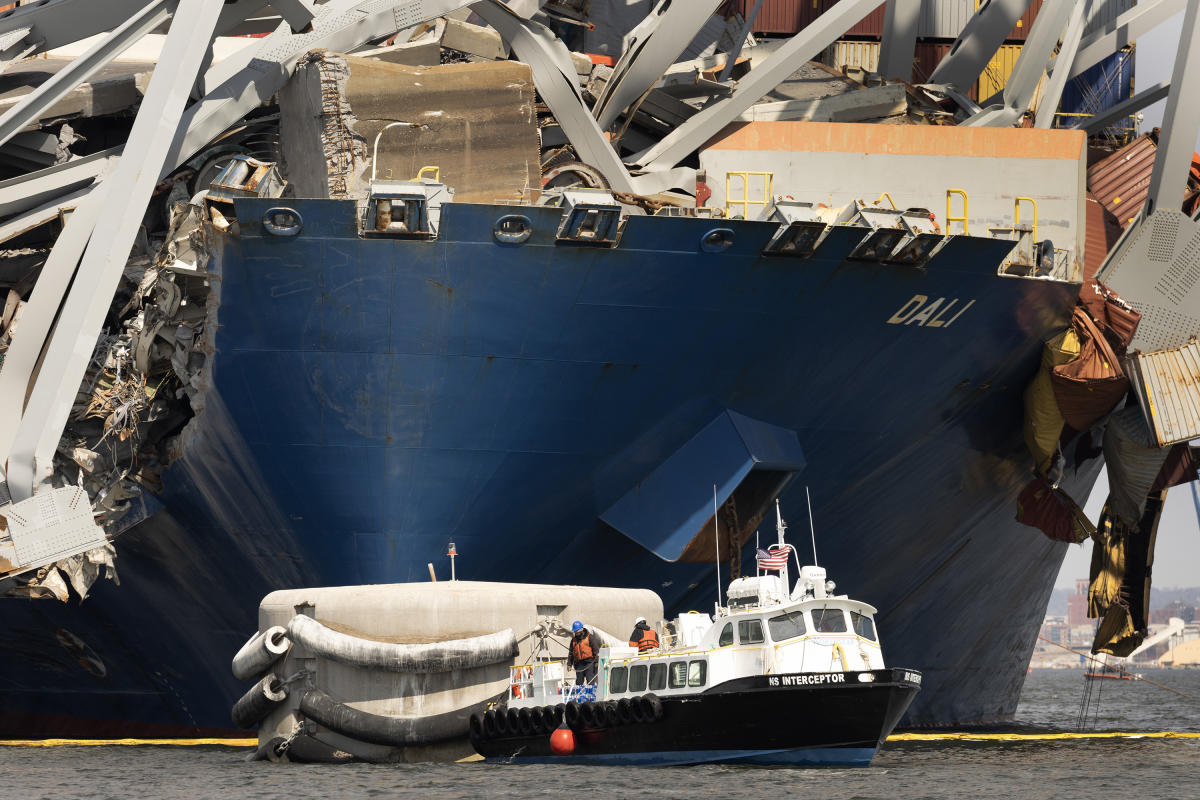Four days after the Dali, a 984-foot ship weighing more than 112,000 metric tons, ran into the bridge and completely knocked it over, authorities are working to clear the water of debris. Six construction workers, who were on the bridge at the time of the accident, were killed. Authorities have only found two of their bodies.
Gov. Wes Moore stressed that recovering their bodies remains a priority, but that weather conditions, paired with debris in the water, make diving “unsafe.” Efforts to recover the bodies have been paused, Moore said in a Saturday news conference, but will resume later. In the meantime, officials are working to clear the shipping channel, which will aid in the salvage process and later efforts to locate the four remaining bodies.
The salvage process is a cumbersome one. Authorities plan to remove debris and pieces of the bridge, refloat the ship, and then continue to remove the wreckage. Slicing up some of the north sections of the bridge and removing it will begin to accomplish that task, as well as open up a “temporary restricted channel,” Moore said, which will “get more vessels in the water around the site of the collapse. That will make other salvage operations easier.
“Once we are able to get a channel reopened, it can potentially be reused for commercial assets, also, but we’ve gotta get it cleared first,” U.S. Coast Guard Rear Admiral Shannon Gilreath said.
Cutting up large structures for removal is time-intensive. When a container ship capsized near Georgia in 2019, it took nearly two years before the ship could be cut up and removed. In a more similar example, when a section of Interstate 35 collapsed over the Mississippi River in 2007, it took crews about three months to remove debris from the water.
Salvage teams were expected to use “gas-powered cutters” to cut into the steel bridge and take sections to a “disposal site,” according to a news release. Maryland Transportation Secretary Paul Wiedefeld said that first piece could be removed and taken to Tradepoint Atlantic as soon as Saturday evening.
“This is the first of many, many, many steps going forward, but it is a huge milestone as we start this process,” Wiedefeld said.
The piece of the bridge will be removed by a crane with a lifting capacity of about 160 tons, said Gilreath. In a few days, the salvage site will be home to 10 tugs, nine barges and seven cranes — including one crane capable of lifting 1,000 tons.
“We’re going to use the larger crane at some point,” Gilreath said. “We just needed it to get here and so it’s here, so when we can get the engineering done and the assessment done and figure out how to cut up that large section that you see on top of the Dali, then that’s when I think they’ll be using that larger crane.”
To complicate an already complex operation, there is also an underwater natural gas pipeline running underneath the incident site. Such pipelines, if damaged, can potentially pose a hazard.
Several groups make up the Key Bridge Response 2024 Unified Command, including local and federal agencies and Witt O’Brien’s, an emergency management consultant representing the Dali’s manager. In a statement, Unified Command said it is “working in partnership with BGE to reduce pressure of an underwater pipeline that spans the width of the channel and runs under the incident site.”
BGE isolated a section of the pipeline and “intentionally released gas from that section as a proactive safety measure in support of the salvage operations.”
“There are no safety concerns or customer impacts at this time,” BGE said in a statement.
